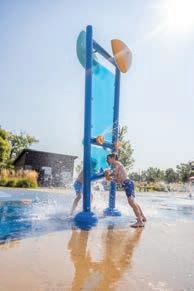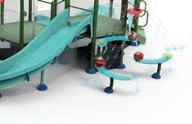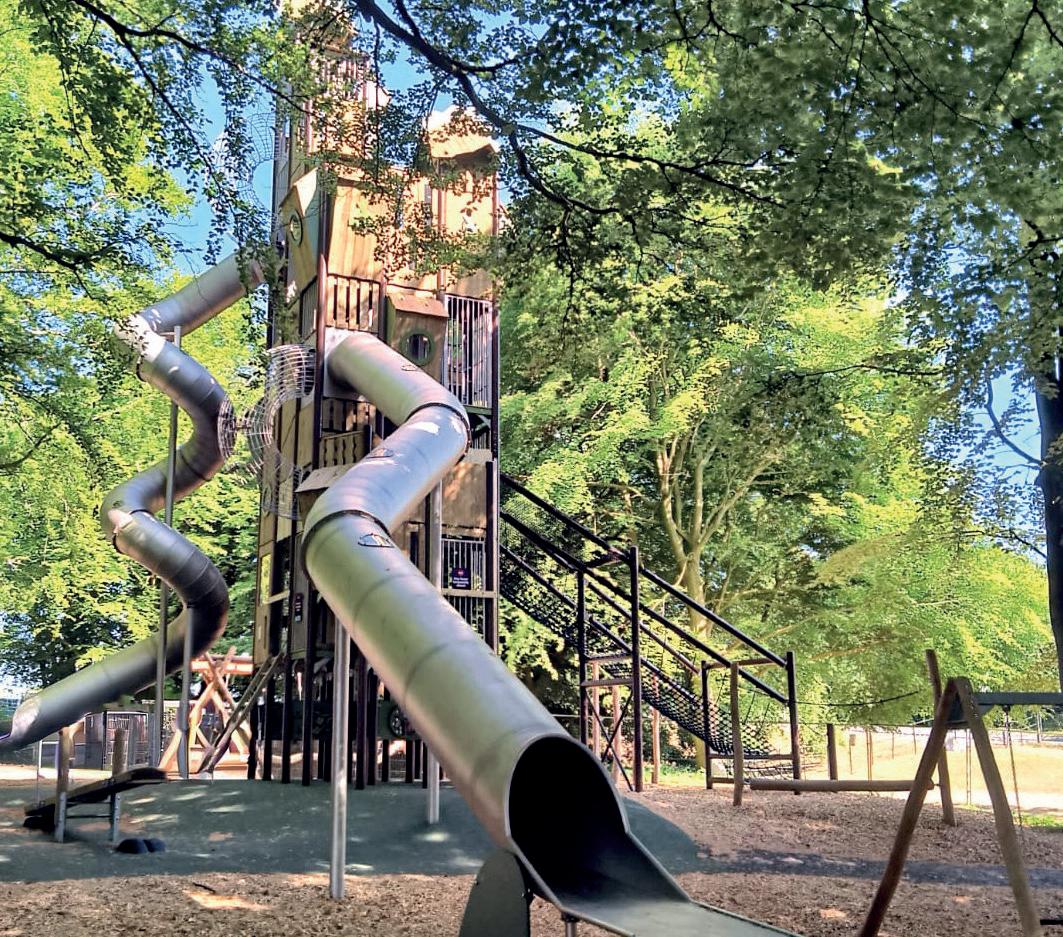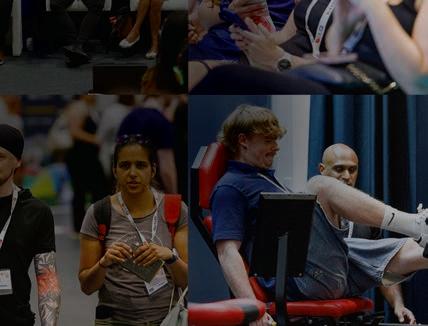

PlayNation UK






LEAD THE DAY
Animation inspired by real childhood adventures

Policy moves LET PLAY

Play in parliament on ground-breaking day

Indoor play
Highlights from AIP Conference
The importance of Play!
Play England campaigns for all children and young people to have freedom and space to play throughout childhood.
We work with national partners and other organisations with shared aims to raise awareness about the importance of play. We lobby government to make fundamental policy changes to protect and promote play, and encourage everyone who has an impact

on the lives of children and young people to recognise and plan for children’s play.
Play England has also built up considerable experience and resources to help support individuals and organisations that work in these particular areas:
Government
Local Authorities
Schools
Playwork

We need your support
The new UK government is making positive noises about understanding the importance of play. However, against this positive backdrop, Play England is suffering from a lack of funds to pay for our essential work campaigning for children’s right and freedom to play. Donate today to support our work. www.playengland.org.uk/donate

www.playengland.org.uk

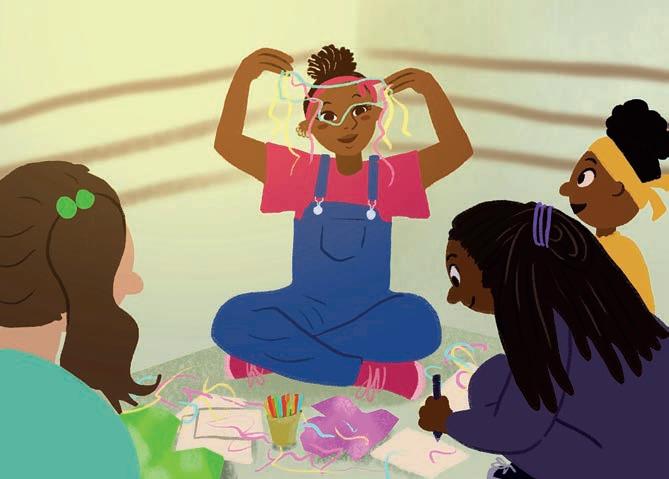


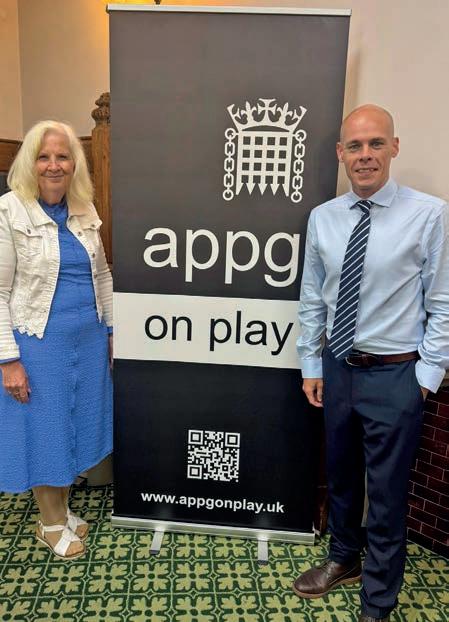



20 In full sail
Work has begun on one of the UK’s largest city centre play spaces in Plymouth – inspired by the city’s location
24 Let play lead the day
A new animation film has been published to inspire families to find ways to play
30 Listening to your audience
PlayNation finds out that designing well-loved play spaces comes down to two steps – listen to the end-users and then deliver on their wishes



John Challinor
Publisher
PlayNation
john@nationmedia.uk
Contributors



Maria Cantarella CEO
AIP
@AsscIndoorPlay

Eugene Minogue
Executive Director, Play England
@ EugeneMinogue

Tom Walker Editor
PlayNation
tom@ nationmedia.uk

Tom Hayes MP
Chair, APPG on Play @ TomHayesBmouth

PlayNation UK
The importance of play and physical activity for young people
PlayNation, in partnership with Play England and SAPCA (the Sports And Play Construction Association), is dedicated exclusively to the dynamic and growing sector of play and physical activity for children and young people. Published bi-monthly, the magazine focuses on the policies, people and places that help young people to play and be more active. Subscribe now and we will email you a complimentary copy of the magazine every two months.










http://www.playnation.uk
Advertising opportunities
Contact John E: john@nationmedia.uk http://www.linkedin.com/ company/playnationmag @PlayNationMag FOLLOW US:
PlayNation is published by SportsNation Ltd in association with Play England (www.playengland.org.uk) and the Sports And Play Construction Association (www.sapca.org.uk) This publication is protected by copyright and no part may be reproduced, transmitted or stored in any print or electronic format without the written permission of the publisher. Every effort has been made to ensure the accuracy of the contents of this publication and PlayNation accepts no responsibility for any error or misrepresentation. Opinions expressed by the contributors and advertisers are not necessarily those of the publisher and we do not accept responsibility of losses or damages arising from them. Printed by Bigwave Marketing Ltd.
Play England looking to appoint independent chair and directors
Play England is looking to strengthen its governance and leadership by adding to its senior leadership team.
The organisation is seeking to recruit and appoint an Independent Chair and two independent directors.
“We are looking for people primarily from outside the play sector who can bring fresh perspectives, expertise, and constructive challenge,” Play England said in a statement.
“These roles will help us deliver our mission to re-norm play in England, champion children’s right to play, and influence the systems and structures that shape childhood.”
Earlier this year, Play England published its 10-year strategy, It All Starts with Play!. According to Eugene Minogue, Play England’s Executive Director, the move to appoint independent professionals marks the increasing importance of play in national policy discussions.

The move shows how play remains firmly on the parliamentary agenda
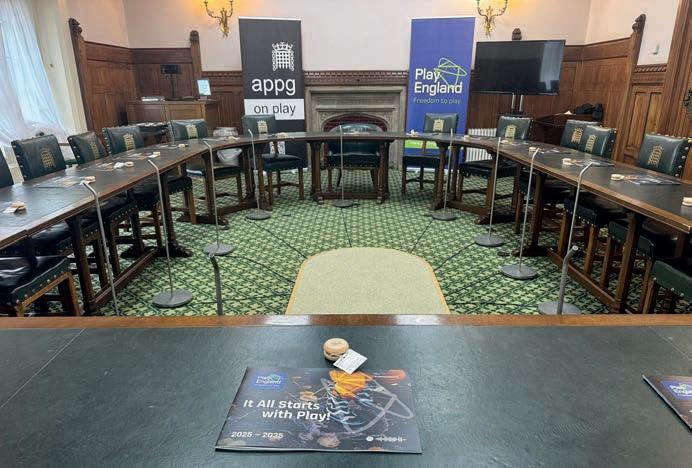
“It is an exciting time to be part of Play England,” Minogue said.
“With play increasingly recognised in policy debates and public life, we need talented people who can bring independent perspectives, expertise and strong networks.
“For the independent roles, we aren’t looking for ‘play experts’ — we already have those on our Board. Instead, we are looking for people who share our values and can bring skills in areas like governance, law, finance and risk.”
Play Su ciency amendment tabled in the House of Lords
In a major win for the play sector, the Play Sufficiency Amendment (NC82) has been reintroduced to the Planning and Infrastructure Bill during Committee Stage in the House of Lords.
Baroness Natalie Bennett tabled the amendment following sustained leadership from Play England.
According to Eugene Minogue, Play England’s Executive Director, the move marks a “critical step” forward in Play England’s objective to restore a play-based childhood for every child in England by 2035.
“This reintroduction in the Lords ensures that play remains firmly on the parliamentary agenda,” he said.
Play is now recognised in national policy discussions
Salford to be transformed into a giant game to get people active
The city of Salford will be turned into a giant game as part of Beat the Street, a novel way of increasing activity levels across a population.
People of all ages are encouraged to ditch the car and walk, cycle or scoot as part of a drive to take children away from screens and back into nature.
An expected 27,000 children and adults, including 76 primary schools, are due to take part as the event gets communities connecting and exploring, and off their phones.
Around 250 beeping and flashing sensors called ‘Beat Boxes’ will be placed on lampposts around the city. Players score points by placing cards on the boxes and, the further players travel, the more points they score for their school, community, charity, or workplace team. Beat the Street encourages people of all ages to be active in their daily lives. It was devised by GP, Dr William

Bird, to make exercise and physical activity fun through gamification.
NHS research links too much screen time with sitting still and not being active — leading to weight gain and affecting sleep and concentration. Research in 2024 by ukactive also stated that two-fifths of
children want to be more physically active than they currently are.
Beat the Street has now been played by more than two million people in 200 towns and cities across the UK and beyond and, typically, 13% of the population of an area takes part.
Update on NOS review published

The UK Playwork NOS Consortium has published a new information sheet that gives an update on the progress of the National Occupational Standards (NOS) on Playwork review. The information sheet (number 3) reports on activities and key achievements made since January 2025. These include the establishment of expert groups, the development of a functional map and the review and drafting of NOS. The information sheet aims to ensure the playwork sector is kept well informed, consulted and engaged throughout the NOS review process.
The UK Playwork NOS Consortium comprises Play Wales, Play Scotland, PlayBoard NI, Play England and The Playwork Foundation.
It is expected that the final NOS will be published to the UK Standards in Autumn 2025.
BTS game co-ordinator Katherine Whittam and Head Teacher
Kari Walker with pupils from Wardley CE Primary School

Westminster ball courts get inclusive upgrade
Two of Westminster’s most tired ball courts – at Churchill Gardens Estate and Church Street – are getting a new lease of life this autumn, thanks to an ambitious refurbishment project led by Play Innovation.
Work began in mid-August and the sites will soon showcase Play Innovation’s signature familyinclusive games, including Street Snooker X, Corner Skills, and the vibrant Funky Hype Multi Goals. The games have been designed to get children, young people, and families moving together in fun, creative ways.

The upgrades also include the installation of a new playing surface, Matchplay 2 – a durable, synthetic sports surface by Playrite – new fencing, floodlighting and roof netting to ensure safe, year-round play.
Marco Boi, founder of Play Innovation, said: “We’ve worked closely with the team at Westminster and taken a holistic approach to the entire project. Each location will be activated with inclusive activity workshops with local charity SportWestminster to maximise the investment by our client.”
Playboard NI looks to add nance leader
PlayBoard NI is looking to add to its senior management team as it looks to grow its reach across the region.
The lead organisation for the development and promotion of children’s play in Northern Ireland is seeking to appoint a new Director of Corporate Services & Finance.
Playboard NI said: “We are looking for a highly motivated and experienced individual to take up the role in which they will hold strategic and operational responsibility for finance, human resources and administration – ensuring strong governance, effective systems, and robust financial controls are in place to support PlayBoard’s continued growth and impact.
“They will also oversee all financial and management accounting and play a key role in organisational planning and the future strategic direction of PlayBoard.”
For more information on the role, visit: www.playboard.org
Industry unites to call for better spaces on Playday
The UK’s leading play organisations came together during this year’s Playday to call for more inclusive and welcoming spaces where children can play freely and feel part of their communities.
Play organisations of the four home nations urged the government and local authorities
to maximise opportunities for play in schools, childcare, youth settings and public spaces which are shaped by the voices, needs, and experiences of children and young people themselves.
The theme for this year’s Playday, on 6 August, was to highlight the importance of quality spaces for play.



PLAYCE celebrates anniversary with award
A project that worked with residents and used a scientific movement model to transform an underused play area in central Portsmouth into a colourful, interactive space, has celebrated its first anniversary, having recently won an award.
PLAYCE Pompey opened in July 2024 and is a versatile and colourful activity space, designed to get the community moving.
The multi-activity playground was a joint project between Portsmouth City Council and the University of Portsmouth. The design is based on a
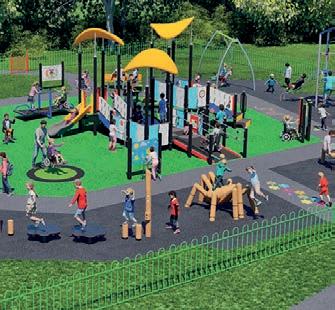
pioneering scientific model for movement developed in the Netherlands, with a focus on being accessible for people of all ages and skill levels, including those with disabilities. There are no separate play areas for different groups, but an integrated activity space for all.
The council’s Portsmouth Homes landlord service and the University worked with local residents to make sure the space would be welcomed and used – particularly by those living in the council homes that surround the area.
Hamble playground reopens
Work to replace and create a new playground at Hamble play area in Belgrave, Tamworth, has been completed. Designed by Wicksteed, the £35,000 plans will incorporate a multi-play unit with towers, connecting bridge and pole slider, swings, sensory panel, seesaw, basket seat and a rock n bowl.
The new playground – which is owned by Tamworth Borough Council – includes low level access, hand holds, plus a wider variety of new play equipment.
Councillor Lewis Smith said: “The new Hamble play area will provide a bigger playground and new equipment. The area will now provide a multitude of play experiences and imaginative play opportunities for children to enjoy.
“A local playground is a wonderful way for parents to introduce young children to playground equipment and new friends. It will be far more exhilarating than the previous play area and more inclusive too.”
Work beings to transform Worthing playground
Work has begun to transform Homefield Park playground with new play equipment chosen by the community.
Last year, Worthing Borough Council asked residents what play equipment they would like to see included as part of planned improvements to the popular park.
Thanks to the participation of more than 110 playground users sharing their views in person – as well as nearly 600 online consultation responses – the council has chosen play equipment specialist Eibe Play to design an inclusive play area that will appeal to children aged between two and 12.
The multi-activity playground opened in 2024
The play area will appeal to children aged between two and 12
AIP Conference 2025: Inspiration Meets Reality
The Association of Indoor Play’s 2025 Conference brought together operators, suppliers and industry experts for a day that was equal parts inspiration and reality check
With 24 Association of Indoor Play (AIP) trade suppliers in attendance at this year’s AIP Conference 2025 – and with food sampling available throughout the day – delegates had plenty of opportunities to connect, discover and experience what the wider sector has to offer.
The event opened with The WonderWorld Story, presented by Narinder Singh Baryah, Managing Director of the WonderWorld Group. He shared the remarkable growth journey of Scotland’s fastestgrowing family-owned leisure brand. From the first site in Falkirk in 2013 to the brand-new Southampton opening in 2025, WonderWorld has continually evolved. The group has diversified into trampoline parks, inflatables and even crazy golf with Electric Thrill, proving that variety really is the spice of life.

Industry insights
Attention then turned to the looming Employment Rights Bill, with Dominic Cooper, Professional Support Lawyer at Citation, giving delegates a timely employment law update. He warned that the sector must prepare for the most significant overhaul in employment law for decades. Sick pay from the first day of absence, unfair dismissal rights from the first day of employment, a ban on fire and rehire and tighter harassment duties will all require careful planning. Further reforms include new rules for zero-hours contracts, stronger family leave rights and the creation of a Fair Work Agency with real enforcement powers. The message was clear: operators cannot afford to wait until 2027 when the final wave of reforms is due. Preparation must begin now.
“Always have a plan B, surround and strategy must evolve in
Singh Bariyah was candid about the challenges along the way. The pandemic nearly broke the business model but strong funding relationships, creative pivots and sheer determination ensured the business emerged stronger. His advice to delegates was straightforward: “Always have a plan B, surround yourself with the right people and accept that leadership and strategy must evolve in a world of wage inflation, rising costs and increasingly demanding customers.”


The focus then shifted to marketing, with Matt Baker, Chief Executive of Destination Marketing, delivering a no-nonsense review of how customer perception is shaped. Parents do not just read adverts; they interpret the quality of a business from the way it presents itself. A slow website, broken social media links or sluggish responses to enquiries create a poor impression long before a family even arrives at the door. His tongue-in-cheek “how to lose a customer” checklist drew knowing smiles but his point was serious. Operators must strip out friction,
Parents do not just read adverts; they

media links or sluggish impression the
AIP Chief Executive, Maria Cantarella (left) with Andrew Kirkwood, AIP Chair
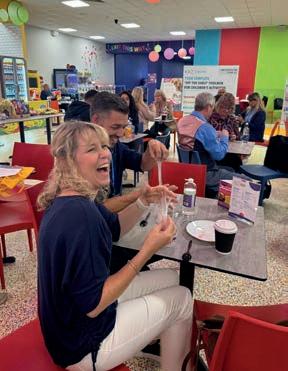

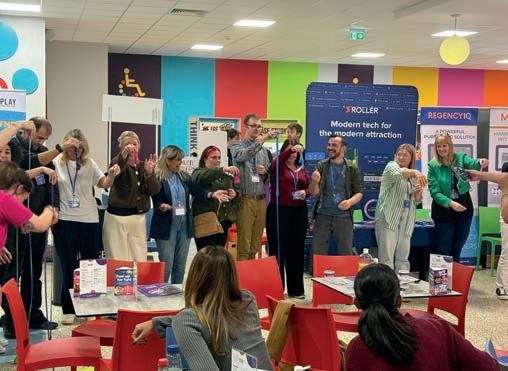



ensure consistency across every channel and embrace storytelling, video and new tools such as artificial intelligence. In a competitive market, the businesses that own their narrative will be the ones that stand out.
Finally, Ken Lunn, Chartered Accountant and owner of Jack in the Box (and AIP’s Finance Director), addressed the topic “where has all the profit gone?”. With inflation, rising wages and the cost-of-living crisis biting hard, many operators are finding that revenue may be up, but profit is slipping away. Ken reminded delegates that profit, not revenue, must be the measure through which every decision is made.
He provided practical tools to help operators tighten margins and encouraged businesses to know their numbers in detail by drilling into profitability per square foot, per head and per activity. He urged operators to challenge costs, from insurance and utilities to consumables and to review pricing more bravely. For example, moving away from blanket discounting and focusing instead on well-packaged experiences such as premium parties, quality food and beverage and loyalty-driven bundles.
Ken also advised the industry to think more like airlines or hotels, using yield management rather than chasing revenue. He closed with a reminder that summed up the day: “Turnover is vanity. Profit is sanity. Cash is reality. Do not just be busy, be profitable.”
Where has all the profit gone?
Key takeaway from Ken Lunn’s session
● Know your costs. Understand the difference between direct, fixed, variable and capital costs. Use break-even analysis to see how many families you need through the door.
● Focus on contribution. Not every pound is equal. Entrance fees usually deliver the strongest contribution, while F&B margins vary. Hot drinks and homemade food can be excellent profit drivers.
● Smart pricing. Fear of price increases often outweighs the reality. Regular reviews are essential. Without them, standards slip and profit disappears.
● Customer value. Success comes from clean, wellkept facilities, friendly staff, good quality food and drink and the right atmosphere. It is rarely about being the cheapest.
● Events and parties. Parties can be powerful profit drivers, sometimes outperforming general admissions.
● Cost savings. Small changes in staffing, heating, cleaning products and food preparation can have a big impact.
● Keep reinvesting. Fresh equipment, wellpresented facilities and quality experiences keep customers coming back.
Play Scotland launches updated play space assessment toolkit
Called Getting it Right for Play, the updated guidance supports the implementation of Play Scotland’s framework for children’s right to play in Scotland.
Shaped by engagement with families, communities and organisations – and informed by recent legislation – the toolkit is packed with useful tips and relevant case studies, giving step-by-step advice and tools to assess and improve play spaces.
Organisations – including local authorities – are encouraged to use the toolkit to engage with children and communities during the assessment and development of any play spaces and projects.
Paul Liddell, Chair of Play Scotland, said: “Getting it Right for Play has been shaped by extensive engagement with families, communities and organisations, with a strong focus

on the voices and experiences of children and young people with additional support needs.
“This guidance acknowledges the specific needs and barriers specific groups of children face and provides local authorities and community groups with
practical assessment tools to help them evaluate and improve play opportunities and spaces.”
To view and download the toolkit – and Play Scotland’s other resources – visit the dedicated toolkit page on the Play Scotland website: www.playscotland.org/resources/
£88m plans to improve children’s lives

The government has committed to investing £88m in youth services and after-school activities –including capital grants for upgrading youth clubs.
The Building Creative Futures package is part of the government’s National Youth Strategy, which is due to be published this autumn, and includes five major areas of investment.
These include the launch of the Better Youth Spaces programme, a £30.5 million fund to improve youth club infrastructure in areas with the highest levels of child poverty. This will go towards smaller capital projects such as new gym equipment and climbing walls.
A further £22.5 million will be invested over three years to create a tailored enrichment offer in up to 400 schools.
PHOTO: PLAY SCOTLAND


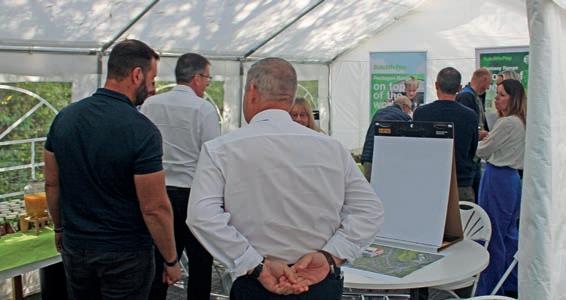

NETWORKING, WORKSHOPS… AND PLAY!
In early September, Sutcliffe Play were delighted to welcome guests from across the country to West Yorkshire for their annual Home Show exhibition. The event, now in its 12th year, brought together representatives from a range of parish, town, district and borough councils, as well as a number of playground installers, at the company’s headquarters in Upton, near Pontefract.
Across the two-day gathering, guests enjoyed informative seminars from leading play influencers including Eugene Minogue, Executive Director of Play England, who discussed the organisation’s new 10year national strategy – ‘It All Starts With Play!’. The strategy sets out a bold vision to restore a play-based childhood for all children by 2035, and his attendance marked another successful collaboration with Sutcliffe Play, following their sponsorship of the strategy’s launch in the House of Commons in May 2025.
Meanwhile, Ben Tawil and Mike Barclay – co-directors of Ludicology – conducted a hands-on interactive workshop, full of practical advice to help local authorities consider the full range of spaces, freedoms, and conditions that shape children’s capability to play where they live.
The speaker line-up was completed by Helen Griffiths, the CEO of Fields In Trust (currently
Sutcli e hosts its 12th annual Home Show exhibition – and it’s a playful success
celebrating the centenary year of its formation), who oversees the charity’s vital work in protecting our parks, playgrounds, and green spaces.
In addition, Sutcliffe Play’s team of Area Sales Managers led guests on a guided tour around the company’s factory, which produces thousands of pieces of high-quality play equipment every year. Visitors also explored the on-site playground, and enjoyed a close-up look at the newest addition: Unicorn, a dynamic multi-play unit which forms part of Sutcliffe Play’s brand-new Fantasy range for toddlers.
The guests weren’t the only ones to benefit from the Home Show, however, as catering throughout both days was provided by The Caring Kitchen, a local business whose profits directly fund a hospice in neighbouring Pontefract.
Sutcliffe Play Managing Director Rob Speirs said: “Our annual Home Show continues to go from strength to strength, and as this is my first as Managing Director, it’s a fantastic opportunity for me to meet our customers and talk to them about our business - in particular our fabulous new Fantasy product range. I’m looking forward to getting a real behind-thescenes insight into their needs and views on Sutcliffe Play and the play industry, whilst creating many fruitful new relationships with first-time guests.”
Policy moves
Two signi cant events took place in Westminster on 2 September – the inaugural meeting of the All-Party Parliamentary Group (APPG) on Play and the latest session of the DCMS Select Committee’s State of Play
Inquiry
Asignificant moment for the play sector, the launch of the All-Party Parliamentary Group (APPG) on Play brings together MPs, peers from the House of Lords and industry experts. The group, which met for the first time at Portcullis House in Westminster, will work towards ensuring that play is recognised, protected and embedded in policy, planning and public life.
Co-founded by Play England, the group includes 42 MPs and peers and is chaired by Tom Hayes MP – with Lord Greville Howard, Natasha Irons MP and Vikki Slade MP acting as vice chairs. Among the group’s aims is to push for a National Play Strategy and champion play sufficiency legislation. It will also advocate for a long-term funding settlement for play, with an annual target of £125m.
During the first meeting, the group heard an overview of Play England’s new strategy, It All Starts with Play!, which was launched in May. Tom Hayes MP also provided those present with additional context, highlighting that the first parliamentary
debate on play in eight years took place in January 2025 and, at an hour, the longest in 17 years.
“Play is essential for every child’s development, health, and wellbeing,” Hayes said. “But it is too often ignored in policy decisions.
“The APPG on Play will change that — working in Parliament to champion all children’s right to play and to ensure play is prioritised in communities and national decision-making. As parliamentarians we need to be the voice of children in Westminster.”
De ning objectives
During the meeting, the APPG also defined its strategic objectives. These were defined as:
● Establish the APPG as Parliament’s cross-party voice for play
● Champion a new National Play Strategy
● Support Play Sufficiency legislation through the NC82 Amendment to the Planning and Infrastructure Bill
● Advocate for a long-term funding settlement for play (£125 million annually)

Baroness Sharon Taylor, Minister at MHCLG (left) with Play England’s Eugene Minogue
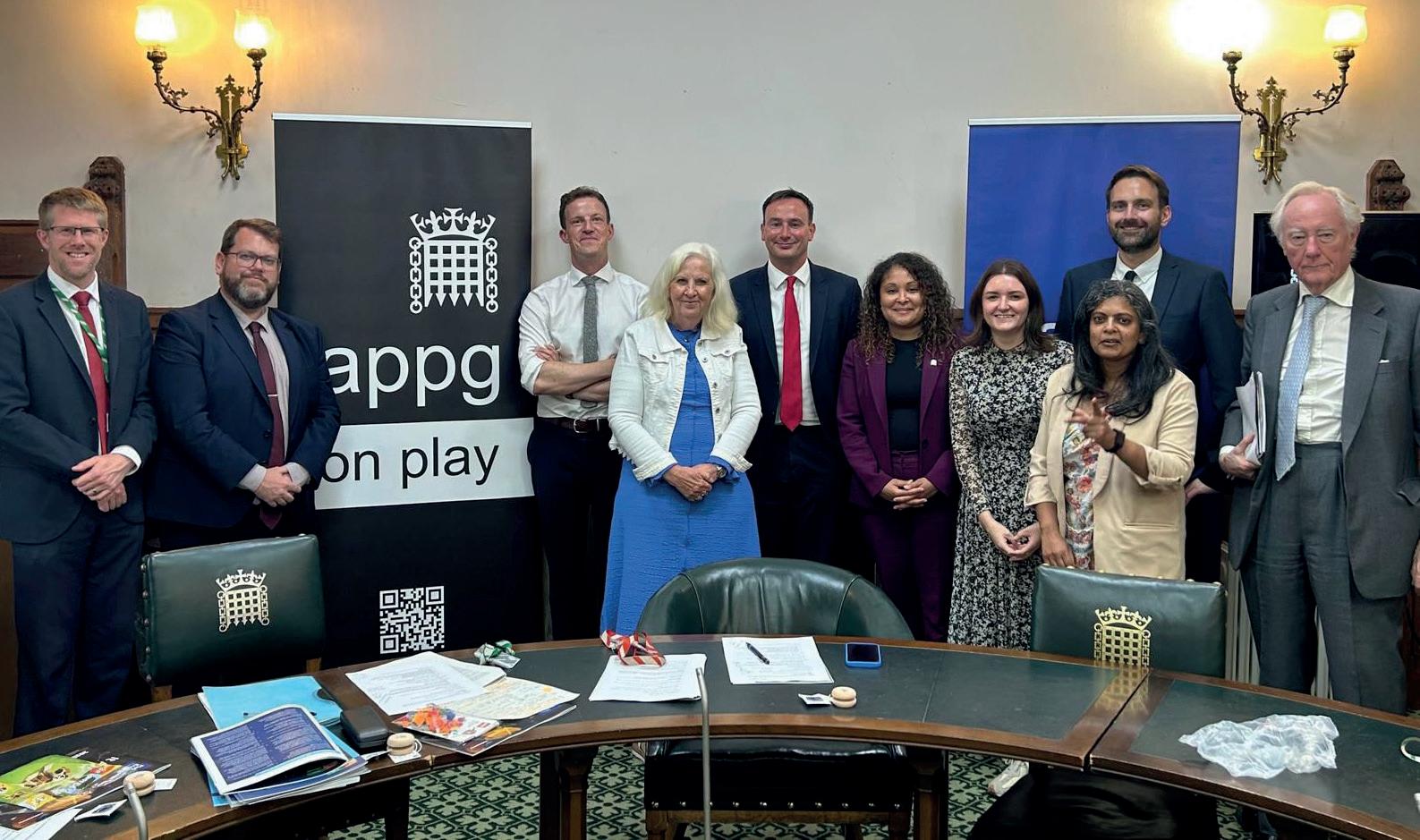
During the meeting, the APPG defined its strategic objectives
Play is essential for every child’s development,
health, and wellbeing
● Support the creation of a Minister for Play
● Align with sector strategies and amplify voices of children, families, and communities
● Reinforce legislative levers including National Planning Policy Framework (NPPF) Reform and the NC82 Amendment
The second meeting of the APPG has been scheduled for Autumn 2025 and the group is likely to meet bi-monthly thereafter. Play England’s executive director, Eugene Minogue, said: “Children’s freedom to play hasn’t just declined – it’s been squeezed out. Earlier this year, we highlighted the scale of the challenge for policymakers when we launched our 10-year strategy, It All Starts With Play
“To truly increase children and young people’s opportunities and guarantee them a right to play necessitates a rethink on how we plan, govern, fund and design for play – across streets, schools, services and society.”
Evidence-based
Play was also on the agenda on another important meeting earlier the same day in the form of the The Culture, Media and Sport Select Committee’s
State of Play Inquiry. During the session – which included two hours of oral evidence – MPs explored the value of play and informal outdoor physical activity for children and young people, heard about the barriers that limit access and considered how Government can better support and promote opportunities for play.
The session was suggested by stakeholders, including the Centre for Young Lives and Playing Out, which invited ideas from across the sector on what MPs should be examining.
The first half of the hearing explored the recommendations in the Raising the Nation Play Commission’s report on the benefits and barriers to play in England, which was published in June. The Committee is likely to explore the role of the planning framework in the provision of play facilities and the level of Government funding for play. The second panel focused on issues related to outdoor play, including its inclusion in the curriculum, and how to tackle disparities in access to play. The session was chaired by Natasha Irons, the MP for Croydon East, who is also a vice chair for the APPG.
Children do not just need a home; they need a childhood, and their childhood starts on their doorstep
Oral evidence
Those giving evidence on the day included chair of the Play Commission, Paul Lindley OBE. He highlighted some of the reasons why play has been “ousted” from the planning process.
“Play is what children do for their work, it is how they enjoy their childhoods and how they learn the skills that they will need for the rest of their lives,” Lindley said.
“Over recent years, there have been two pressures on planners, local authorities and developers that have relegated children’s voices within what is being built. One is around efficiency and the need ultimately to maximise the number of houses on a piece of land, resulting in small gardens or no gardens – one in eight children grows up with no garden. Secondly, around risk, there is the risk of providing something as a result of which a child is going to get hurt or that is deemed not safe in some way.”
When asked what facilities and designs he would like to see adopted in new developments, Lindley responded: “There are things like the London Plan Policy S4, which requires all new residential developments to provide at
least 10sq m of good-quality, accessible play and informal recreation space per child.
“There are non-cost things too, like removing “No ball games” signs and traffic-calming measures, which do pitch the rights of different people in the community against each other, but they are small costs. There are those sorts of things, together with training and working on ways for children and their families to have the appropriate voice when planning decisions are being made.”
Going outdoors
The second panel of the session looked in more detail at outdoor play and education. Those giving evidence were Ingrid Skeels, co-founder of Playing Out – a parent and resident-led movement restoring children’s freedom to play out in the streets and spaces where they live – and Playing England’s Eugene Minogue.
Describing the success of Playing Out, Skeels said: “We had the idea of closing the road briefly for a time after school – remove one of the main barriers, which is traffic – so that children could reclaim the street for some play.

Children’s freedom to play hasn’t just declined – it’s been squeezed out

The reception was amazing. Children came out who did not know each other. Some of them were at the same school and they did not even know they lived on the same street. That is how indoors and separate we have all become. They met other children, played with children of different ages and neighbours came out who had not met each other.
“From that, the idea started to spread in Bristol and around the country and to other countries, because it tapped into something that parents feel and that we were feeling. So far more than 1,600 street and estate communities have regularly organised Playing Out sessions, with 50,000 children benefiting regularly. Those are the absolute bare minimum numbers, because we do not always get answers from councils as to how many roads they have closed.”
Eugene Minogue then made the case for policymakers to begin to rethink how the UK’s built environment is created – so that every aspect of it could encourage outdoor play.
“Currently, we build our whole built environment around the car,” he said. “The infrastructure for children has been decimated, and we need to treat play in the same way that we do utilities. It is critical infrastructure. Children do not just need a home; they need a childhood, and their childhood starts on their doorstep.

“That is why we need things like play sufficiency legislation. We have started to move towards it with the changes we secured in the national planning policy framework last December. Although policy is progress, it is not protection. We need play sufficiency legislation so that local authorities have a duty to consider children in the built environment. It is not just around more playgrounds, although those would be welcome because we have lost well over 800, and we have lost over half of our adventure playgrounds in my lifetime, since 1980.”
The APPG on Play has a dedicated page on the Play England website, where details of forthcoming meetings, agendas, minutes and key updates will be published. To access the site, visit: playengland.org.uk/appg
The second meeting of the APPG has now been scheduled for Autumn 2025
Places IN FULL SAIL

Work has begun on one of the UK’s largest city centre play spaces in Plymouth

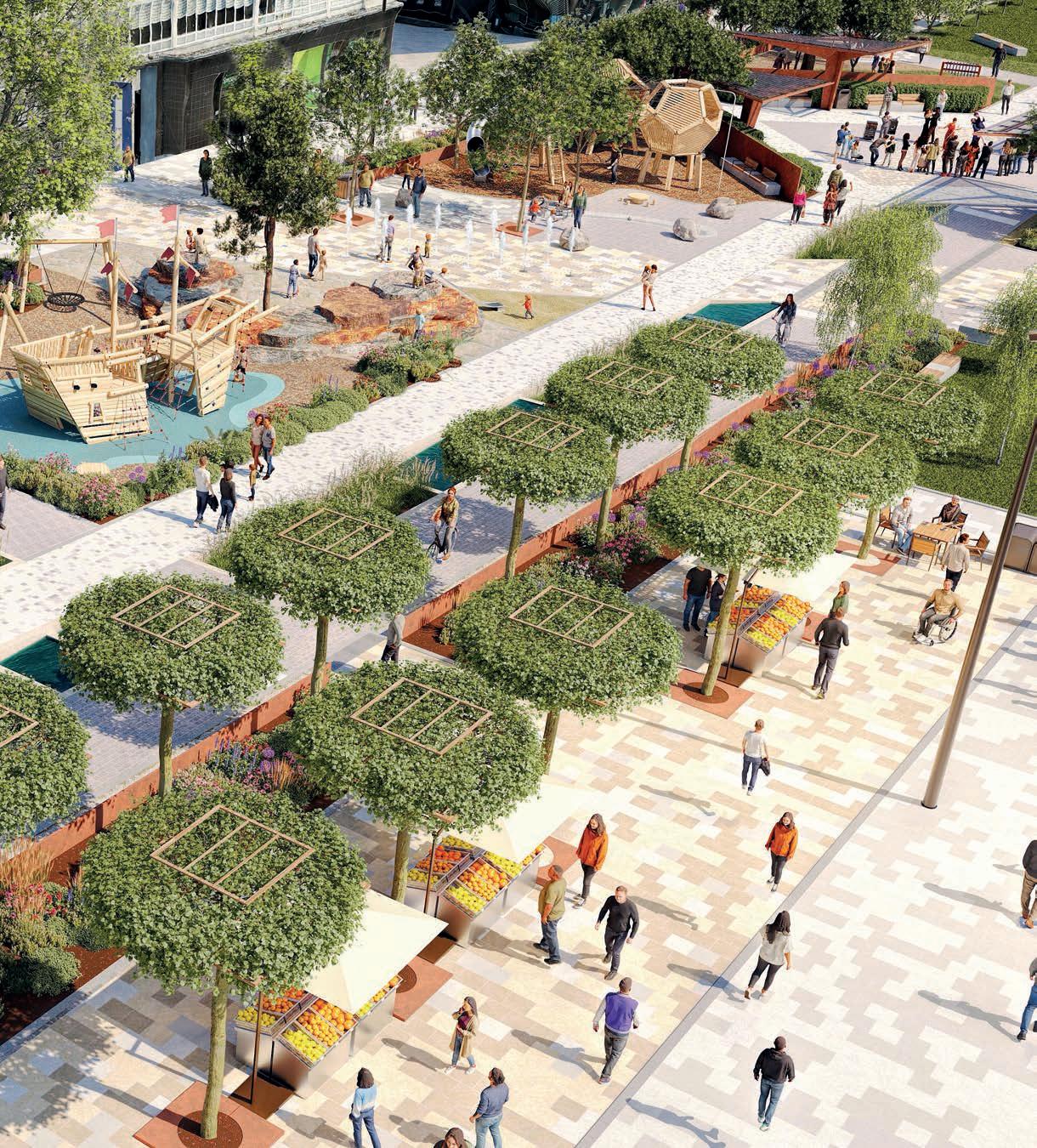

It’s set to be one of the biggest city centre play spaces in the country and – with a key feature wooden ship – Plymouth’s Armada Way play village is ship-shaping up to be a destination in its own right. Measuring 1,120sqm – the size of nearly five tennis courts – the development will put play into the heart of the city’s massive regeneration project as part of a deliberate move to change how people use the post-war city centre.
The play area is part of a larger regeneration project of Armada Way, driven by Plymouth City Council. Councillor Mark Lowry, Cabinet Member for Finance and city centre champion, said: “The High Street has changed dramatically. Online shopping is here to stay but we still want
our city centre to be alive and buzzing with people. This regeneration programme is about bringing people back into the city centre – not just to shop but to play and to meet up.”
Bringing play to the people
Earlier this year, Plymouth City Council set out a vision to create 10,000 new homes in the city centre, so somewhere for children to play on their doorstep will be crucial to families having a happy, healthy life. The Armada Way play village goes a long way to cater for the need.
Martin Ivatt, the council’s Regeneration and Placemaking Manager, said: “There’s a lot riding on this, with more families expected to live in the city centre, we want to create something special.
Places

THE DESIGN REFERENCES PLYMOUTH’S MARITIME HERITAGE AND ITS ROLE IN EXPLORATION
“It’s going to be a fun and fantastic place for kids – but this is about more than play – if just a few more people spent £5 on a coffee and cake watching their little ones, that’s money going into our businesses. Kids playing there after school means more people out and about in the city centre, it feels safer and busier.”
Innovative designs
The play village was designed by city-based Studio Agora Architects and was based on biomes. Themed into zones – desert, mountain, aquatic, forest and grasslands, the village is about encouraging young explorers to use their imagination.
As well as swings and slides, the desert island section for toddlers will have a pirate ship for wannabe sailors from Britain’s Ocean City. There’s circular wooden seating for story telling – handily close to the Central Library.
A large mound of rocks with a slide is planned for the mountain section while there’s lots of wet play in the aquatic zone, with water jets and a shallow rill for damming and scooping water. In a nod to Plymouth’s history, this part will have studs on the ground marking where the Plymouth leat ran – a water course dating back to Drake’s era.
The forest section will have giant dodecahedron shaped tree houses that link
to each to each other with slides, cargo nets and monkey bars to swing from.
There will be a quieter, calmer sensory play zone separate to the main play area for children who are neurodiverse. Based on the grasslands theme, it will have varied surfaces, levels of grass for texture and interest, bark mulch and sand areas. Special attention is being paid to sound with a sound stone, windpipes, impulse spheres and tubular chimes.
The selected features have taken into account access and usability by children with disabilities.
Among the play companies supplying equipment for the project are KOMPAN, Richter, Duncan & Grove. Installation work began 24 September.
Lee Ferris from Studio Agora said: “The concept is based on Get Set Explore. The design references Plymouth’s maritime heritage and its role in exploration.
“As children we are at our most inquisitive, so wanted them to explore all different areas within the play village and ignite sparks of interest in travel and different habitats through play.”
The project’s principal contractor is Morgan Sindall, with LARC construction as groundworkers and OCMIS delivering the water feature and dancing jets. The Rathbone Partnership are working as landscape architects, Ridge as structural engineers and WSP as project managers.


Retail-ready grip socks Drive secondary spend

























LET PLAY LEAD THE DAY


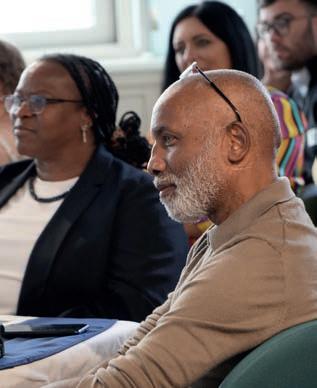




A new animation lm looks to inspire families to nd ways to play

Childhood education platform
Tapestry and Amber OgunsanyaWilliam, aka Playworkeramber, have joined forces to launch an animated film called Let Play Lead the Day.
Aimed at families, the film and accompanying resource pack celebrate the joy and importance of children’s play, as well as telling the story of Amber Ogunsanya-William’s own experience of growing up in an adventure playground.
Childhood experiences
Amber Ogunsanya-William’s childhood was spent in Tower Hamlets in London which had very limited access to parks and green spaces. Her father, however, managed an

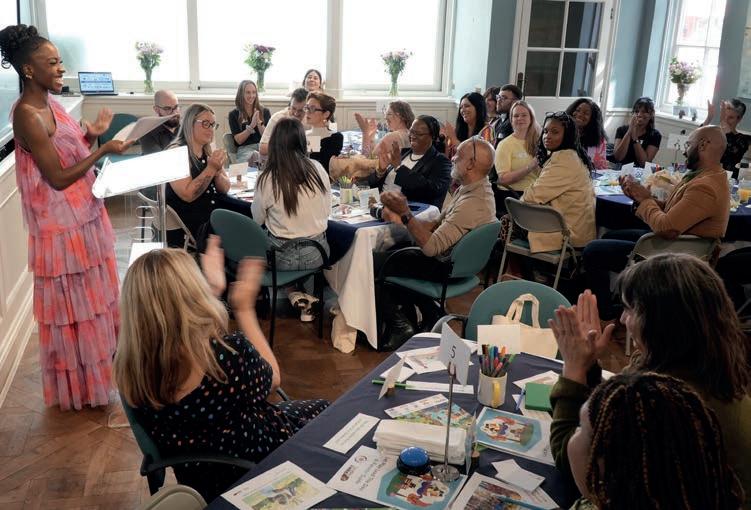
The launch event for the animation and its resources was held at Tapestry HQ in Lewes





My father was a magician of imagination who transformed ordinary space into extraordinary adventures
adventure playground and this gave her an imaginative wonderland in which she thrived.
“I literally grew up in the adventure playground,” Ogunsanya-William says. “My father was a magician of imagination and a storyteller who transformed ordinary space into extraordinary adventures. I took it for granted but now I realise my experience of play was quite different to my peers.”
Figures from Play England highlight how play – and opportunities for play – continue to be under threat. According to Play England data, there has been a dramatic drop in children’s access to play compared to previous generations. Just 27% of children said they regularly play outside their homes, compared to 71% of the baby boomer generation. For those aged specifically between 55 - 64, it was 80% showing that rates of play have declined steadily in just a few generations.
Collaborative approach
Tapestry collaborated with Ogunsanya-William on the animation in order to help champion children’s freedom to play. The company works extensively within early years and with primary schools.
Dr Helen Edwards, co-founder of Tapestry and a former nursery owner, said: “We hope all the settings and schools that use Tapestry will share the animation with the families in their learning communities, helping to spread the message about the essential role of play.”
A recent survey by Tapestry showed that early years settings are using a variety of ways to share ideas and resources for play at home, Dr Helen Edwards explained: “We found they were providing newsletters with ideas for play at home, modelling play in class and using tools like Tapestry to share ideas.”
People

Play doesn’t require expensive toys – it’s everyday magic that can happen anywhere
Angela Carter, Head of Community Services at Lloyds Park Children Charity – which runs a nursery in Walthamstow, London –highlights the central role of play in children’s development and in creating community. “At LPCC, we know play is more than fun, it’s how children learn, connect, and grow,” she says.
“Through play, families build understanding, empathy, and stronger bonds. It’s a shared language that brings us together across generations and cultures.”
The film is supported by an accompanying free resource for families, which encourages families to repurpose materials for play and to think about play in the everyday. Written by Ogunsanya-William, it offers practical, real-world examples, playful prompts and gentle encouragement for parents and carers who might feel overwhelmed or unsure about how to bring more play into their homes.
A full package
“Let Play Lead the Day isn’t just a resource, it’s a celebration of everyday magic, a rallying cry for joyful connection and a powerful invitation for families to rediscover the transformative power of play,” Ogunsanya-William explains.
“Together with Tapestry, we’ve crafted something that’s not only visually beautiful but emotionally resonant, practical and deeply rooted in the lived experiences of families, playworkers, and childhood advocates. At the heart of the project is a vibrant, heartwarming animation that brings play

Who is Playworker Amber?
Amber Ogunsanya-William is an awardwinning international inclusive play worker, consultant, and play advocate who believes that play is a universal superpower. Her vision is to change how the world sees plays, redefine the role of play in education and community development, while driving positive behaviour change and elevating performance through purpose-driven solutions. Her work has earned her the honour of being named the first-ever NSPCC Champion of Childhood.
to life in the most accessible and inspiring way.
“Based on my own story, growing up surrounded by play and guided by my dad, a legendary playworker and now adventure playground manager, the animation shows how imagination can transform even the simplest moments into extraordinary adventures. It’s a joyful reminder that play doesn’t require expensive toys or elaborate setups. It can happen anywhere, in the kitchen, on the bus, in the garden - using repurposed materials, storytelling, and a little bit of wonder. It invites parents and carers to see play not as a task, but as a powerful tool for connection, creativity, and emotional growth.”
Let Play Lead the Day will be shared with 14,000 families across the UK and is supported by a number of organisations – including NSPCC, Play England, Eureka Children’s Museum, PlayBoard NI and PlayNation magazine.
“This project is a love letter to childhood, to caregivers, and to the playful spirit that lives in all of us,” Ogunsanya-William adds.
● To watch the animated film and to download the accompanying resource pack: https://tapestry.info/let-play-lead-the-day/
sutcliffeplay.co.uk

Inclusive
We design play equipment and play spaces that open up play to all abilities.

Quality
Our skilled engineers and fabricators all take pride in putting quality first.
Your local British Manufacturer leading the way with sustainability, quality and after sales support.





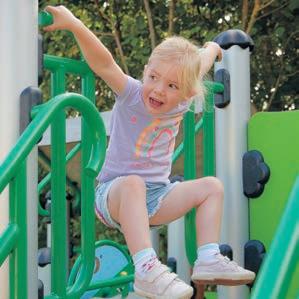
Sustainable
Sourcing and manufacturing locally is the most sustainable solution for all.







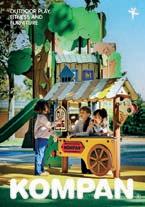



















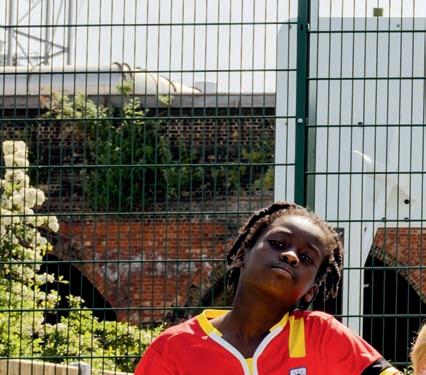




















THEY




PLAY
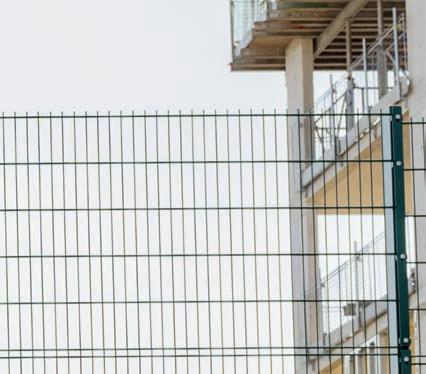



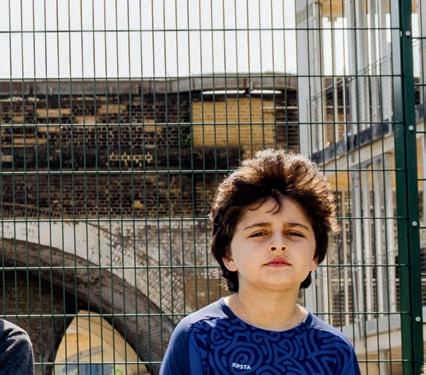






& builders of beautiful sports courts.






Places LISTENING TO YOUR AUDIENCE
PlayNation nds out that designing well-loved play spaces comes down to two steps – listen to the end-users and then deliver on their wishes

No one wants to see schoolyards with unused play equipment in them.
The success of a play area – in other words, its popularity – is usually down to two aspects: a design that takes into account the different age groups that will use it and a selection of inspiring equipment that delivers to the design’s brief and intentions. Therefore, choosing age-appropriate playground equipment is the key to an engaging and buzzing schoolyard design. Get it right and the result can deliver a huge positive impact on pupils’ overall wellbeing, classroom performance and learning skills. To achieve results, however, requires a little bit of clever planning – which is why it is always
a good idea to speak to specialists in play.
One of these specialists is the play equipment company, Kompan. “School playground planning holds immense potential for promoting physical activity, fostering social interactions and encouraging imaginative play,” Kompan says.
“School-age children seem able to do and learn almost anything. They master basic coordination skills such as running, climbing and balancing; however, because their range of skills is so broad, offering skill development within a wide range of challenges is essential when planning a school playground.”
To help schools choose age-appropriate equipment Kompan has compiled a guide, outlining some design ideas for playgrounds. The guide is
When deciding on your new playground, you need to engage with your ‘consumers’ – the children

divided into three categories – primary school, secondary school and special needs. For more info, visit the Kompan website: kompan.com
Another company that specialises in a partnership-led approach when it comes to designing play spaces is Jupiter Play and Leisure.
“Our work is a result of a collaboration, understanding a space, a community and our client’s requirements,” Jupiter says. “Whether it is a landscape-led approach to connect children to nature, or a playground project to activate a community, our diverse portfolio of play projects showcase the innovation we deliver every day.”
Marco Boi, founder of Play Innovation, has a similar approach.
“When deciding on your new play ground, you need to engage with your ‘consumers’ – the children,” Boi says.
“What would they want to see included? Which sports would they like to play? While it’s impossible to please everyone, a well-managed consultation will give you an overview of what they would love to have – and end up spending hours on.
“This is the part of a project journey that I, personally, am most passionate about. Listening to, understanding and considering children – and ensuring their needs are at the heart of the project.”
So, what do well-designed, thoughtful and innovative school play areas look like? PlayNation has a closer look.
Places
New nature-inspired playground opens at Clapham Manor Primary
Clapham Manor Primary School, nestled on the edge of Clapham Common in Lambeth, South London has transformed its outdoor space with a brand-new Proludic play area designed to bring children closer to nature while encouraging active, imaginative play.
The centrepiece of the playground is Proludic’s focal Origin’ Robinia Multiplay Unit, a striking wooden structure featuring slides, a tunnel, climbing wall, elevated playhouse and wobbly walkways. With 29 different play functions, the structure can accommodate up to 34 children at once, fostering both adventure and teamwork.
Alongside it sits the Monkey Bars Wooden Trail, a horizontal ladder module crafted also from Robinia wood and stainless steel, designed for up to four players to challenge their balance and coordination.
The play area is completed with soft wetpour surfacing utilising a leaf design in parts, combining safety with natural inspiration. Using Robinia
Transforming play and learning at Croft Community School
Earlier this year, Playdale Playgrounds completed the installation of a new playground at Croft Community School in Durham. The project was part of the school’s expansion and focused on turning a blank outdoor space into an inspiring environment for play, learning, and sensory development.
Designed with inclusivity and creativity in mind, the playground combines physical challenge, imaginative play, and outdoor learning. Equipment such as the Inclusive Orbit Roundabout, Team Swing, themed multi-play, and sensory play panels encourages children of all abilities to play together, develop key skills, and explore at their own pace.
The new playground has transformed the school grounds into a vibrant hub where pupils can build confidence, stay active, and enjoy learning outdoors – all while celebrating the school’s unique identity.

wood throughout, the Origin’ range recreates the feel of a forest trail, encouraging children to climb, balance and explore in a setting that blends seamlessly with the surrounding trees.
“Teachers report that playtime is now greeted with even greater enthusiasm, while pupils have praised the new equipment,” Proludic said. “The school community has welcomed the installation as a valuable investment in both fun and learning.”



Playscheme provide adventure trail for Acomb pupils
Before joining Playscheme as member of the salesteam, Michael Carr was the Deputy Head at Acomb Primary School, and is still close friends with the Headteacher there. So, when the school approached Playscheme to help transform its playground, Carr knew the company had to create something truly special.
The brief was clear: a space that worked both for children wanting to be active and for those who prefer a quieter playtime. As a result, Playscheme installed one of its innovative Scramble Stax adventure trails, a dynamic climbing and balancing challenge that encourages children to develop strength, coordination and confidence.
For the quieter corners of the playground, Playscheme replaced an old tarmac surface with soft artificial grass and added welcoming booth-style seating. These spaces have quickly become a haven for children who want to sit, read, play games, or simply relax. Due to the design, the playground has something for everyone – opportunities to be physically active and social, but also for some calmness.

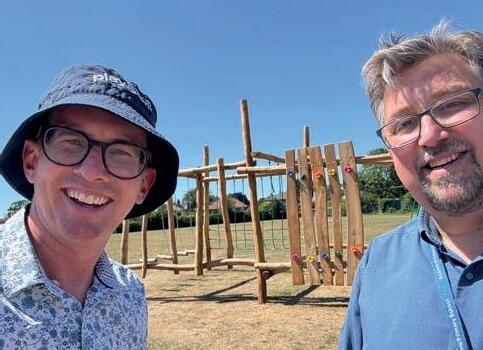
Michael Carr (l) with Head Teacher Lee Haynes
Places
Portsmouth school opens splash pad in memory of “shining star” pupil
Ustigate Waterplay worked with the team at Cliffdale Primary Academy in Portsmouth to establish an allyear-round water play on the school’s playground. The project was brought to life by a unity of collaboration and fundraising between the school and its community. The project was launched in honour and memory of a “shining star” pupil, called Hayden-Jay Archbold, who had sadly passed away.
Cliffdale Primary Academy is a primary special school for approximately 220 pupils aged 2-11 years who have complex learning difficulties; the vast majority of pupils have autism and severe learning difficulties.
Thanks to the project, the school now has a water play favourite for all ages and abilities. There is an award-winning Vortex Astra with its gentle halo of cascading water streams and
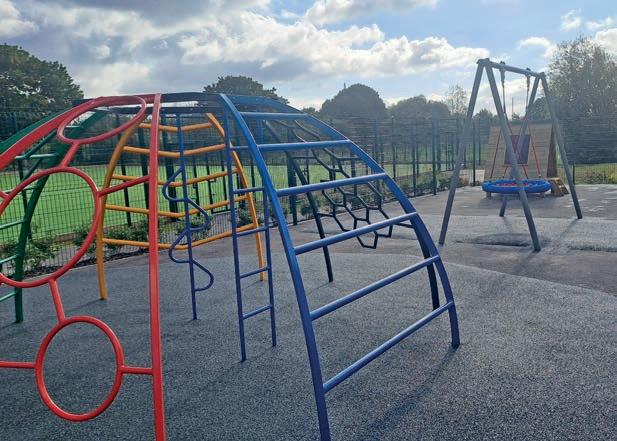
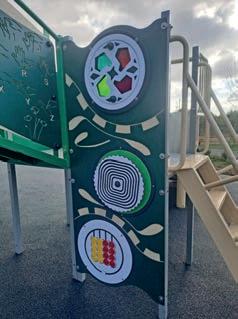


360-degree rotation, several round sprays and a puddle with an activator, because Cliffdale pupils love rainy days and a puddle to splash in.
There is a giraffe bench to sit and enjoy the view and a monkey glockenspiel to enjoy a tune or two. Also included are aided language boards designed by Cliffdale Primary Academy, to help children to communicate. Plant room insulation has been installed to ensure water play can be enjoyed all year round.
Inclusive play in action at Co-op Academy Brierley
Wicksteed has delivered an inclusive playground project for Co-op Academy Brierley in Leeds. The play area is designed to meet the diverse needs of pupils aged between four and 16 with special educational needs and disabilities.
Working closely with the school, Wicksteed created a tailored Sensory Integration Area and submitted a complementary plan for their Autism Suite, which was accepted and went above and beyond the original brief. Every element was chosen with inclusivity at its heart – focusing on variation in difficulty, movement, colour, and layout to support a wide range of physical and sensory needs.
The space features low-maintenance, high-quality equipment offering climbing, swinging and spinning opportunities – including two swing types, two roundabouts, sensory engagement points and the showstopping Treetop Towers. With dual deck heights, slides and interactive panels, this imaginative centrepiece promotes fine and gross motor development, sensory exploration, and collaborative play.
“It’s more than a play area — it’s a space that supports learning, exploration and joyful experiences for every child, no matter their ability,” Wicksteed said.








